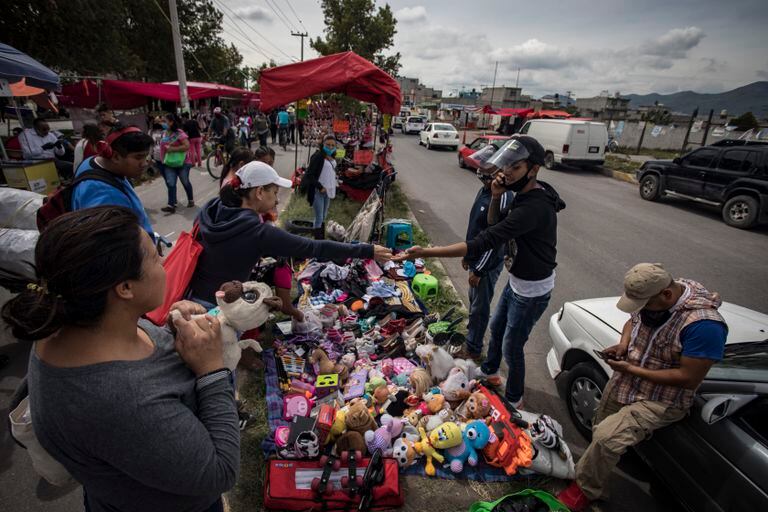An informal tianguis in the Potrero del Rey neighborhood, in Ecatepec, Nayeli Cruz / El País
The employment figures give Mexico a break.
In July, 1.5 million jobs were added, according to the latest survey by the National Institute of Statistics and Geography (Inegi) published this Thursday.
Since April, when 12 million people left the job market due to lockdown, 6.5 million jobs have been recovered.
This is mainly due to a growth in informal employment;
the formal one remained in the red until July - since the beginning of the crisis, more than a million jobs have been destroyed in this area.
Despite the gradual recovery, the indicators remain well below those of a year ago.
As the reopening of the economy advances, which began in early June, the hours worked increased.
Weekdays of more than 48 hours went from 21.6% in June to 24.9% in July, while those who work from 15 to 34 hours a week decreased from 21.4% to 18.1%, as shown by the National Survey of Occupation and Employment.
Likewise, the so-called “temporary absentees”, workers who were suspended due to the effects of the pandemic but maintain a labor relationship, went from 8.2% in June to 7.5%.
The underemployment rate, which includes people who have more time available to work, in July 2020 stood at 18.4% of the employed population, well below the 29.9% in May.
The Inegi survey gathers both informal and formal work and makes no distinctions.
The recovery the survey points to is due almost entirely to an increase in informal employment.
On the formal side, the signs are less clear.
In July, 3,097 affiliates to the Mexican Social Security Institute (IMSS) were lost, after the 83,311 in June.
However, President Andrés Manuel López Obrador has stated in recent days that at least 90,000 workers were added in August, a figure that has yet to be officially published.
Although the July figures show a consolidation of the recovery trend —the workforce went from 53.1% to 54.9% -, the improvement is slower than in June, the first month of reopening.
Then, the people who were employed or looking for work went from 47.4% to 53.1%.
In any case, the indicators are still well below those of a year ago.
In July 2019, the workforce was 60.5%, five percentage points more than now.
As for the current underemployment rate, this is still more than 10 percentage points higher than that of a year ago, when it stood at 7.9% of the employed population.
After GDP plummeted 18.7% per year during the second quarter of the year, President López Obrador has repeatedly insisted that "we have hit rock bottom and are on the way out."
The recovery will be, according to the presidential version, in the shape of a V, that is, a sharp drop followed by an equally rapid rebound.
The president has set the goal of creating two million formal jobs through the construction of megaprojects such as the Mayan Train, a goal that still seems distant.
Financial institutions are more cautious about the speed of the rebound due, in part, to the still uncertain duration of the pandemic.
The Bank of Mexico pointed out last week that GDP could fall as much as 12.8% in 2020. If confirmed, it would be the worst drop since the Great Recession in the 1930s.


/cloudfront-eu-central-1.images.arcpublishing.com/prisa/GDO6WKTQ7RFXX2LM5LUOSIODT4.jpg)





